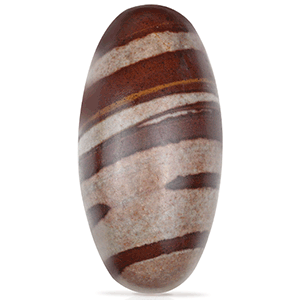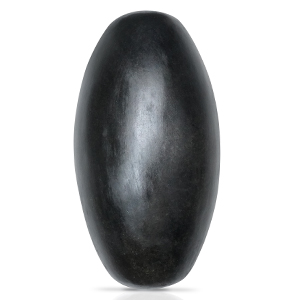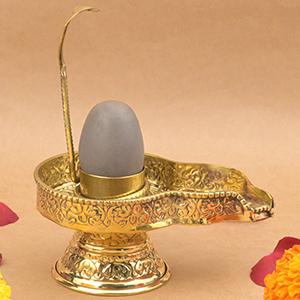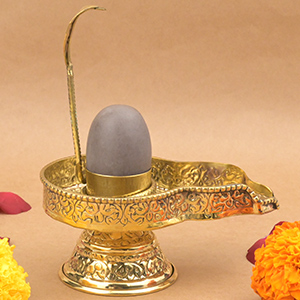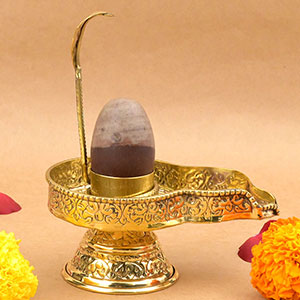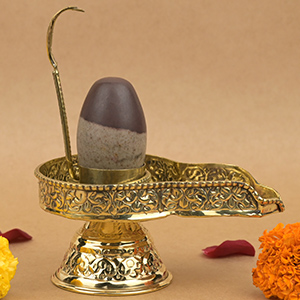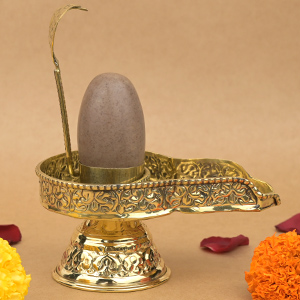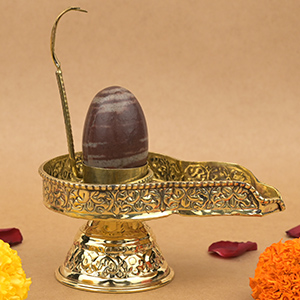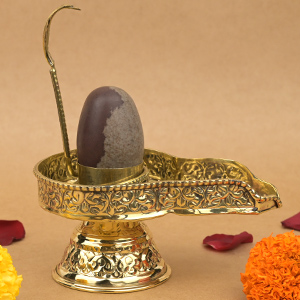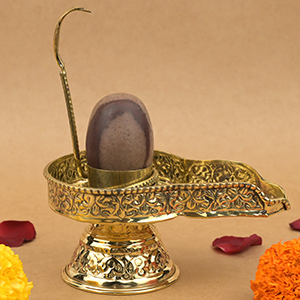Worldwide Fast & Safe Delivery | Oldest ISO 9001-2015 Certified Rudraksha Organization in the World | Your Trusted Brand Since 1997

Shopping Cart
Narmada Shivling
Narmada Lingams & Shivlings are considered as the most auspicious for worship of Bhagwan Shiva. Our range includes Narmada, Black Narmada, and White Narmada Lingams in different sizes. We have any Narmada Lingams set in Narmada Stone Jalhari Yoni Base & special Narmada Shivlings with natural OM imprints on them. Worshipping Narmada Shivlings bestows Bhagwans Shiva’s blessings, good health, wealth, prosperity, protection & success in all areas of life.
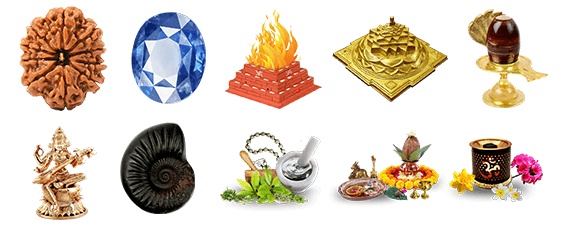
- About
- Types
- Benefits & Price
- FAQs
What is Narmadeshwar Shivling?
The Narmadeshwar Shivling, also known as the Narmada Shivling or Lingam, is a naturally formed stone exclusively found in the Narmada River bed in the village of Bakawan, Madhya Pradesh, India. The Narmada Lingam is created solely by the flow and current of the Narmada River water. It may be hard to believe when you see these Narmada River stones, as they are perfectly shaped into an egg-like, elliptical Lingam form. The Narmada Shiva Lingam is categorized as Swayambhu Lingam, which means it is self-created or the mark of God's existence. The stone's shape and distinct markings symbolize the cosmic union of Shiva and Parvati.
History of Narmada Shivling
According to ancient texts, the Narmada River is considered sacred because it is thought to have originated from Bhagawan Shiva's perspiration. For centuries, followers have valued the river's spiritual significance. They have gone on pilgrimages along its banks to seek blessings and participate in sacred rituals. The Narmada Shivling, which appears naturally in the riverbed, is believed to be a direct manifestation of Shiva's divine presence. Devotees revere the Narmada Shivling as a powerful symbol of Shiva's divine blessings and protection. These sacred stones are used in a variety of ceremonies and puja rituals, as well as during meditation practices to invoke Mahadev blessings for spiritual growth, purification, and liberation from worldly attachments.
Saints, sages, and devotees from all over India have long revered the Narmada Shivling since ancient times. Worshipping the Narmada Shivling with devotion and sincerity can bring immense spiritual merit and blessings. Pilgrims embark on challenging journeys to the Narmada River to gather these revered stones, which are subsequently placed in temples or personal altars for worship. The Narmadeshwar Shivling continues to be a powerful symbol of spirituality and inspiration for many devotees seeking enlightenment and divine blessings.
Where is Narmada Shivling found?
The Narmada Shivling is found in the Narmada River, one of India's most sacred rivers. It comes from the Amarkantak hills in Madhya Pradesh. These cylindrical stones found in the riverbed are revered as sacred symbols of Shiva's presence and blessings by devotees. The Narmada Shiva Lingam is found only in the part of the Narmada River, which flows through Madhya Pradesh and not in parts where the river flows through the state of Maharashtra and Gujarat.
Narmada Shivling stones can be found in smaller quantities in other riverbeds throughout India, but only those found in the Narmada River have the unique characteristics and properties described on this page.
How are Narmada Shivlings Formed? (Svayambhu)
The geological formation of Shiva Lingam stones is a continuous process influenced by natural forces. They are formed through a complex interaction of geological factors, river erosion, and unique mineral composition.
According to researchers, the Narmada Lingam Stone was caused by an event that occurred one million years ago when a large meteorite crashed into the Narmada River, causing the impregnation of rocky riverbanks and rocks in the riverbed of the Narmada. Due to the impregnation of the rocks, there was a fusion of the meteorite and the minerals of the planet Earth, resulting in the formation of unique crystalline rocks with powerful qualities.
These rocks start off as rough and uneven shapes, but the river's forceful currents gradually shape these crystalline rocks over time and take on the elliptical shape of a natural lingam with stunning patterns. The Narmada Shivlings carry the highest frequency of any stone found on earth.
How to Worship Narmada Shivling?
Abhishekham is the traditional method of worshipping Bhagawan Shiva and is believed to be His preferred form of worship. The Rudra Abhishek is a sacred ritual performed by bathing the Shivling with a mixture of liquids while chanting sacred mantras and hymns. The vibrations produced during this procedure are bursting with an abundance of positive energy.
Appropriate days for Rudrabhishek puja include Mahashivratri, Mondays of Shravan Maas or all days of Shravan Maas or Sawan Maas, monthly Shivratri days, Pradosham days, and Mondays throughout the year.
Narmada Shivling Abhishek Procedure
The Vedic puja rituals encompass all five elements in the worship of God. Here is a brief procedure for performing Rudra Abhishek at home.
- Bath the lingam with pure water.
- Offer all Abhishekam liquids one by one.
- All this while chanting “Om Namah Shivay”.
- Offer Water mixed with Gangajal and Gulab Jal (Rose water).
- Offer Unboiled milk.
- Offer Sugarcane juice and Fruit juices.
- Offer Panchamrit.
- Wipe the Shivling with a clean cloth and place it on Pedestal.
Now chant the Sadyojaat mantra:
'Om Sadyojaatam Prapadyaami Sadyojataajava Namo Namaha
Bhave Bhavenaati Bhave Bhavasvamaam Bhavodbhavay Namaha'
Offer Sandal Paste making a Tripunda on His Western Face with Vamdev mantra:
‘Om Vamdevaya Namah, Jyeshthaay Namah, Shreshthay Namah, Rudraay Namah, Kaalay Namah, Kala Vikarannaay Namah, Bal Vikaranaay Namah, Balaay Namah Bala Pramathanaay Namah, Sarva Bhoot Damanaay Namah, Manomanaay Namah.’
Offer dhoop and incense while Chanting:
'Om Aghorebhyo Ghorebhyo Ghor Ghor Tarebhayaha
Sarvebhya Sarva Sharvvebhyo Namaste Astu Rudra Roopebhyaha'
Offer flowers while Chanting:
'Om Tatpurushaaya Vidmahe Mahadevaay Dheemahi
Tanno Rudraha Prachodayaat'
Conclude the Puja by Chanting Shanti Mantra
Om Shanti Shanti Shanti
Click Here to Read a Detailed Rudrabhishek Procedure
Significance of Narmada Shivling |
Narmada Shivling Scriptural Reference
The Narmada Shivling is a symbol of Bhagawan Shiva that holds immense spiritual significance as it is naturally found in the sacred Narmada River, and its been worshiped since ancient times.
The Skanda Purana mentions that the Narmada River (also called Rewa) sprung from the body of Bhagawan Shiva, and the name Narmada was also given by Shiva himself, a reason for which Narmada is also known as Bhagawan Shiva's daughter. Therefore the river is also called Shankari. The Narmada river is considered so sacred that you don't require to take a dip in it; just seeing the River is equivalent to taking a dip in the holy river Ganga.
In the ancient Scriptures there is mention of the word Narmada (नर्मदा) which means ‘Magnificent Mother’. The holy river Narmada is the form or Rupa (रूप) of Goddess Narmada, who like Ganga (गंगा) removes the sins of those who bath in her waters. Narmada river is also considered the most sacred and revered among the holy rivers in certain scriptures.
As per the scripture Yajnavalkya-Samhita, Banalingams are a representation of Shiva Himself. He assumed the form of Lingam on request of His adherent devotee, King Banasura, to bless Him. Hence, the Lingam is revered as Banalingam. Worship of a Banalingam is believed to procure one benefit equivalent to the worship of a crore Lingams. Its worship bestows one with material enjoyment and worldly success without getting attached to them.
The Brihat Vaivarta Purana describes three kinds of Lingams which are Svayambhu (self-created) which is called Vyakta – bestower of salvation, Banalingam (collected from a certain river), which is Avyakta – giver of worldly happiness and the Sailalinga (Lingam made of stones) which is the bestower of happiness and salvation. The White Banalingam from the sacred Narmada river falling in all three categories makes it the highest form of Lingam.
According to the Shiva Purana, the Narmada River originated from the sweat of Bhagawan Shiva after intense meditation. The river is believed to embody the divine energy of Shiva, and the stones found in it are highly revered as symbols of Shiva's presence and blessings.
How to identify Original Narmada Shivling?
To identify original Narmada Shivlings, look for naturally polished cylindrical stones with the Narmada Shivling’s distinct patterns. These patterns are generally made of shades of brown, black, and gray. In many cases, they can be identified gemologically by their characteristic disseminated red lines or spots.
The Narmada River's currents are extremely strong, giving the stones a smooth and polished natural appearance. Original Narmada Shivlings hence differ from hand-carved or polished stones in that they have a distinct and natural texture and naturally occurring patterns.
Furthermore, real Narmada Shivlings have a certain weight when held in your hands; they are not light stones. To ensure that the Narmada Shivling is authentic, only purchase it from reputable websites that specialize in selling genuine Narmada Lingams like Rudra Centre
Narmada Lingam
The Narmada Shivling is renowned for its natural, smooth, elliptical shape and intricate markings, unique beauty and spiritual significance. These imprints are believed to embody the divine energy of Bhagawan Shiva and Parvati. This natural occurring Shivling is known for its miraculous qualities and is believed to fulfill the desires of devotees. Worshipping this Shivling is considered highly virtuous. Narmada Shivlings have incredible healing abilities and can effectively activate the body's Chakras. It is commonly worshipped at home.
Black Narmada Lingam
The black Narmada Lingam natural elliptical shape and smooth surface in unique deep black color symbolizes the infinite and formless aspect of Bhagawan Shiva, making it very sought after. This impressive Lingam enhances meditation, mental grounding, and spiritual growth through a deep connection with Shiva's energy. This Narmada’s black lingam is renowned for its excellent protective properties, including the ability to withstand negative influences and purify the environment.
White Narmada Lingam
The white Narmada Lingam stone’s smooth white color reflects a unique beauty in its purity and promotes spiritual growth and mental clarity, bringing a sense of peace to the environment. It promotes psychological and emotional well-being, inner peace and harmony. Its unique vibrational properties make it perfect for meditation and connecting with higher spiritual realms.
Banalingam
Banalingams are extremely rare lingams of translucent properties only found in the Narmada river. Banalingams are very similar to Narmada Lingams, and for years traders have been selling Narmada Bana lingam online and at stores stating that Narmada and Banalingam are the same, but that is not the case.
Read More: Difference Between Narmada & Bana Lingams
The Yajnavalkya Samhita states that the Banalingams found in the Narmada River are considered highly sacred as they are believed to be the exact forms of Shiva, which were assumed by God at the request of Banasura. Worshipping a single banalingam yields equal benefits to worshipping a crore of other limgans.
The Suta Samhita mentions that the finest Banalingams have a shape similar to lotus seeds or hen's eggs. Scriptures state that Banalingams can be easily placed in the puja altar and worshipped without no need for consecration or the usual ritual of invoking the divine presence (avahana) since the divine presence is already there in its natural shape and will continue to be even without any ritual.
Banalingams bring both worldly success and liberation from worldly duties. It is claimed that the Banalingams are highly effective when worshipped, surpassing any other lingam in its power.
Difference Between Narmada & Banalingam
Narmada Lingam and Banalingams are Swayambhu (self-forming) formed in Narmada river. Banalingam is translucent white, while Narmada Lingam is opaque, found in mixed shades of brown and black. When light is placed behind the Bana Lingam, it displays vibrant and mesmerizing radiance. Banalingams are comparatively rarer as they resurface from water bed once in ten years. They are formed and lie at the very depths of the Narmada river and usually do not appear so frequently as other forms of Narmada Lingams. They only rise during turbulent water conditions or when the river swells due to heavy rain.
When carbon undergoes pressure and heat over the years in the earth's crust, it results in the formation of Graphite. When it undergoes further pressure and heat for more years, it results the formation of diamonds. Similarly, the natural stones in the Narmada river get naturally rolled over the years, resulting to the formation of Syayambhu Narmada Lingams. And when Narmada Lingams undergo further pressure from sacred Narmada river currents over a longer period, their opaqueness starts reducing, rendering to the formation of translucent and more powerful Banalingams. Thus, Banalingams are like Narmada Lingams but are more exclusive and rarer.
Banalingam being in the depths of the Narmada river, dwelling in its purity for years, has rendered it to resonate with Shiva Tattva in higher proportion and is closer to Him than Narmada Lingams. Like Shiva Who is absorbed deep into the state of Samadhi for many years, Banalingam stays in the depths of Narmada for years, beautifully personifying the pure state of Samadhi and making one feel closer to Bhagawan Shiva when worshipped upon.
Special Symbols on Narmada Lingams
The surface markings, patterns, and colors of Narmada Shiva Lingam stones are among their most distinctive features. The markings on each stone differ greatly and frequently consist of stripes, natural patterns, or concentric circles. These patterns are considered to be the female energy emerging from the stone and are thought to be organic imprints of the divine energy.
It is worth noting that when these natural markings resemble special symbols such as Shiva's Trishul, the Svastika or the sacred syllable AUM, they appear diffusely on the stone and are extremely rare, due to the Narmada river's currents and the stone's mineral composition.
Benefits of Worshipping Narmada Shivling
Worshiping the Narmada Shivling has many material and spiritual benefits. It purifies the mind and heart, improves meditation, fosters harmonious relationships, and supports connection to divine energy. It offers protection, promotes inner peace, and encourages spiritual growth.
The Narmada Shivling enhances positive energy, promote emotional balance, and bestow divine blessings on health, prosperity, and overall well-being.
Here are the benefits of worshiping the Narmada Lingam:
- It brings positive energy to the mind and body.
- It relieves all sorts of mental and physical ailments.
- It fosters emotional balance and overall health.
- It purifies the heart from negative memories and sorrows.
- It pacifies the malefics of all inauspicious planets.
- It increases concentration and the capability to meditate.
- It helps to maintain harmonious relationships.
- It preserves harmony between husband and wife.
- It gives freedom from negative beliefs and emotions.
- It protects against evil spirits and tantric attacks.
- It brings new opportunities and success at work.
- It promotes contentment in the environment.
- It amplifies the positive energies around.
- It gives peace of mind and satisfaction.
- It removes Vastu Dosha.
Rules For Worshipping Narmada Shivling
To maximize the benefits of the Narmada Shivling, please consider the following rules.
- Place the Narmada Shivling on a clean altar, facing east or north.
- Kindly handle the Shivling with care, making sure to avoid touching it with unclean hands or impure substances.
- Never intentionally desecrate or disrespect Narmada Shivling
- Ensure that the Shivling is kept clean and open, with an adequate amount of space around it.
- Make sure to regularly pour on pure water or unboiled milk.
- Avoid offering Tulsi, turmeric, and Ketaki flowers.
- Recite Shiva mantras in its presence.
Although no mandatory, it is recommended to perform Abhishekam (ritual bathing) with Panchamrit which consits of milk, curd, honey, ghee and sugar. Afterwards, gently wipe it dry with a clean cloth.
Narmada Shivling Price
Natural Narmada Shivling prices range from USD 2 to USD 2000, with an average of USD 200. The price of the stone varies depending on its size and weight, as well as the rarity of its markings such as the presence or absence of certain special symbols on its surface. Our original Banalingams with stone Yoni base start at USD 112 and go up to USD 282, depending on their natural design.
Why Buy Narmada Shivling from Rudra Centre
Rudra Centre has over 20 years of excellence in distributing Rudraksha and spiritual products and services worldwide. We offer a wide selection of genuine, outstanding stones, including rare and unique products that are exclusive to our store. Our products have received over 100,000 testimonials, highlighting their exceptional quality. We deal only in original Narmada Shivling stones which are sourced from the Narmada river beads from more than 10 years.
How to Care for the Narmada Shivling?
Our original Narmada Shivlings do not require any special care. Simply keep it and the area where it is installed clean. Gently pour fresh water or unboiled milk, on the Shivling on a regular basis.
Avoid using harsh chemicals or abrasive materials that may damage the surface. Maintain its original position, facing east or north, and ensure that the surrounding area is dust and debris-free.
You may enhance the beauty and positive vibrations of your Narmada Shivling by adorning it with fresh flowers after properly watering the Lingam.
What to do if Narmada Shivling breaks?
Narmada Shivling are very hard and usually will not break very easily unless you drop them. If the Narmada Lingams get damaged or crack it is advisable to safely dispose of them. You can bury the Narmada Lingam in soil or immerse it in a natural water body like pond, lake, river, sea or ocean
None
The Narmada Shivling is a naturally formed stone with Lingam shape found only in the riverbed of the Narmada River in Bakawan, Madhya Pradesh, India.
The Narmada Shiva Lingam is found only in the part of the Narmada River that flows through Madhya Pradesh and not in the parts where the river flows through the states of Maharashtra and Gujarat or in other parts of India.
Narmada Shivlings are formed by the powerful currents of the Narmada river gradually shaping the stones on the elliptical shape of a natural Lingam with stunning patterns.
Yes, besides the most commonly found opaque Narmada Lingam in various shades of brown, grey, white and black, there is a rare type of translucent Narmada Lingam called the Banalingam.
Abhishekham is the traditional method of worshipping the Narmada Shivling, which is performed by bathing the Shivling with a mixture of liquids while chanting sacred mantras.
Narmada Shivling should be kept in a clean and open space facing east or north with regular bathing and offerings, avoiding Tulsi, turmeric and Ketaki flowers.
Yes. The Shiva Purana encourages women to worship Bhagawan Shiva in Shivling form.
Apply Filters
Price
Rudra Centre Online Collection
Affiliations


Why Choose Us?
World’s Oldest & Most Trusted Website on Rudraksha, Gemstone, Pujas, Spiritual Products & Services.
Achieve Healing, Empowerment & Success With RRCT.
Credibility Since 1997
Fastest Delivery
Expert Advise & Counselling
Worldwide Distribution
Vedic Pooja Energisation
Over 100,000 + Testimonials
Join Our Newsletter
